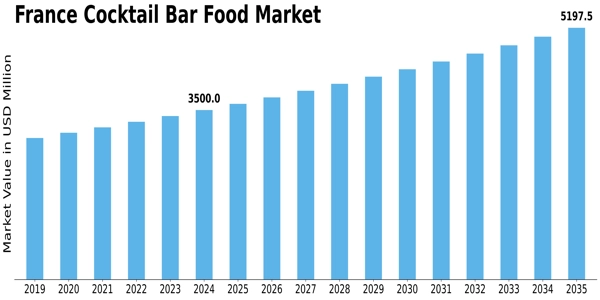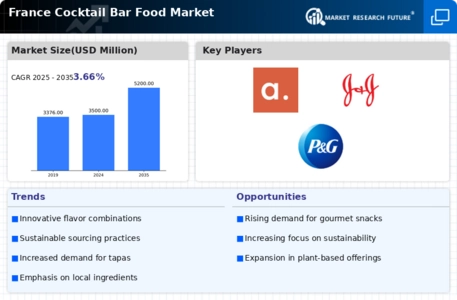France Cocktail Bar Food Size
France Cocktail Bar Food Market Growth Projections and Opportunities
The cocktail bar food market in France is subject to various market factors that collectively influence its dynamics and growth. One of the key drivers is the vibrant and diverse culinary culture in France, known for its emphasis on high-quality ingredients and sophisticated flavors. The French have a rich tradition of savoring good food and drinks, creating a strong demand for unique and delectable offerings in cocktail bars. This cultural inclination towards gastronomy provides a fertile ground for the growth of the cocktail bar food market.
Government regulations and policies also play a significant role in shaping the cocktail bar food market in France. Regulations related to alcohol licensing, food safety, and hygiene standards impact the operation of cocktail bars and the preparation of food. Adherence to these regulations is essential for establishments to ensure compliance and maintain the trust of consumers. Understanding and navigating the regulatory landscape is crucial for businesses to thrive in this market.
The market is further influenced by changing consumer preferences and trends in the food and beverage industry. With an increasing focus on experiential dining, consumers seek innovative and visually appealing food options that complement their cocktails. The demand for artisanal and locally sourced ingredients has also gained prominence, reflecting a broader trend towards sustainability and a preference for high-quality, authentic experiences. Successful businesses in the French cocktail bar food market are those that can adapt to these evolving consumer preferences and create unique, memorable offerings.
Economic factors contribute significantly to the performance of the cocktail bar food market. France's economic conditions, including factors such as disposable income levels and consumer spending habits, directly impact the purchasing power of individuals. Economic stability and growth generally lead to increased discretionary spending on dining out, positively influencing the market. On the flip side, economic downturns may result in a shift in consumer behavior, with potential implications for the market's performance.
The competitive landscape of the cocktail bar food market is characterized by factors such as location, ambiance, and menu offerings. Strategic positioning in popular areas, creating inviting atmospheres, and curating diverse and appealing menus are crucial for attracting and retaining customers. With the prevalence of social media and online reviews, a positive reputation and unique selling propositions become key differentiators for success in this competitive market.
Cultural and societal factors also play a role in shaping the French cocktail bar food market. Trends such as the growing interest in wellness and conscious consumption influence consumer choices. Cocktail bars that incorporate healthier and more sustainable food options into their menus may resonate well with the health-conscious segment of the population. Additionally, cultural events, festivals, and celebrations contribute to fluctuations in demand, providing opportunities for businesses to tailor their offerings to seasonal or cultural trends.
External factors, such as the impact of global events or health crises, can also affect the French cocktail bar food market. Unforeseen events, like the COVID-19 pandemic, have demonstrated the importance of adaptability and resilience in the hospitality industry. Businesses that can pivot their strategies, embrace technology for delivery and online presence, and ensure health and safety measures are in place are better positioned to navigate external challenges.
















Leave a Comment